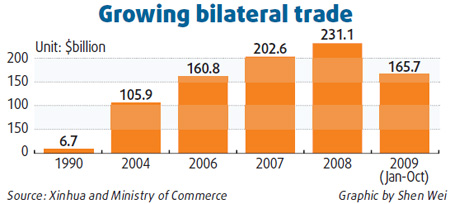Top Biz News
China allays fears of ASEAN nations over CAFTA
By Wang Bo and Ding Qingfen (China Daily)
Updated: 2010-01-08 08:06
 |
Large Medium Small |

The China-ASEAN Free Trade Area (CAFTA) will not harm the interests of ASEAN nations, but rather spur bilateral trade between the two regions, said government officials and experts yesterday.
The CAFTA, which came into existence on Jan 1, would lead to reduced tariffs for nearly 7,000 products covering a wide range of sectors, they said.
During the past few months, ASEAN nations represented by Indonesia, had expressed concern that sectors like textiles and steel would be badly hit in their countries as CAFTA would give an edge to cheaper Chinese imports and also lead to job losses.
"Such worries are understandable. But the FTA is mutually beneficial. With full consideration of economic development levels and market capacities of both sides, the FTA will advance the regional economic integrity by eliminating barriers of trade and investment," said Yi Xiaozhun, vice-minister of commerce, at the ceremony marking the establishment of CAFTA in Nanning yesterday.
"Policymakers from both regions have reached consensus that trade pressures would ultimately be transformed into an impetus that drives the economic development of the whole region," said Yi.
"The need-of-the-hour is to share work and cooperate to make the FTA a win-win strategy for all concerned," said Xu Ningning, executive secretary-general of China-ASEAN Business Council.
The textile sector is one area where the two regions can cooperate more closely. China's prowess has been in the manufacturing of finished garments while the ASEAN region excels in semi-manufactured textile products like cotton cloth, yarn and chemical fiber cloth.
Experts have also suggested that China should step up its investments to the ASEAN region.
"The (Chinese) investments would be a reassurance to those (regions) who are worried," said Eric S. Maskin, professor at Princeton University and the 2007 Nobel economics laureate, at a business forum following the ceremony.
"China is certainly committed to increase its investment in the ASEAN region," said Yi.
An investment fund worth $10 billion was launched recently to help finance projects initiated by China and ASEAN in sectors like infrastructure, energy, manufacturing and services.
CAFTA is the world's largest free trade area of developing countries and covers a population of 1.9 billion, accounting for about $4.5 trillion in trade volume.













